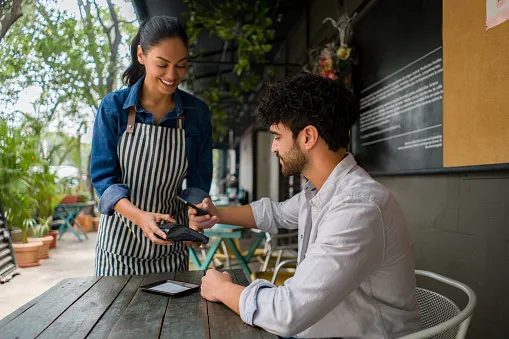
According to a research study of American teens ages 12-15, those who used social media over three hours each day faced twice the risk of having negative mental health outcomes, including depression and anxiety symptoms. Adolescents are finding that they can access online information about their health concerns easily and anonymously. Excellent health resources are increasingly available to youth on a variety of topics of interest to this population, such as sexually transmitted infections, stress reduction, and signs of depression. However, because of their young age, adolescents can encounter inaccuracies during these searches and require parental involvement to be sure they are using reliable online resources, interpreting the information correctly, and not becoming overwhelmed by the information they are reading.
Teenage girls sort through hundreds of photos, agonizing over which ones to post online. Boys compete for attention by trying to out-gross one other, pushing the envelope as much as they can in the already disinhibited atmosphere online. But this survey reveals that only a minority of teens say they have been civically active on social media in the past year via one of the three means asked about at the time of the survey. One-in-ten teens say they have encouraged others to take action on political or social issues that are important to them or have posted a picture to show their support for a political or social issue in the past 12 months.
In today’s digital age, social media has become an integral part of the daily lives of young people. Platforms like Facebook, Instagram, Snapchat, and Twitter provide a space for youth to connect with their peers, share experiences, and express themselves creatively.
Peer Pressure and Comparison
Another way social media affects teenager’s mental health is by exacerbating any existing problems with low self-esteem. Teens are particularly vulnerable to feeling down about themselves and their bodies when they follow certain celebrities and influencers online. They’re getting content, feedback and pressure from many more people than they ever would encounter in the real world.
But adolescence is an equally important period of rapid development, and too few of us are paying attention to how our teenagers’ use of technology’much more intense and intimate than a 3-year-old playing with dad’s iPhone’is affecting them. In fact, experts worry that the social media and text messages that have become so integral to teenage life are promoting anxiety and lowering self-esteem. Teens who see social media as having a mostly positive effect on people their age are more likely than teens who see mostly negative effects to say teens’ experiences on social media are better than parents think.
According to the Centers for Disease Control and Prevention, “youth who report any involvement with bullying behavior are more likely to report high levels of suicide-related behavior than youth who do not report any involvement with bullying behavior.” Prinstein spoke specifically about websites or online accounts that promote disordered-eating behaviors and nonsuicidal self-injury, like self-cutting. Alina shed some light on why social media is such an addictive vice for young minds. ‘Adolescence is a time when peer relationships are particularly important, so there may very well be pressure from the peer circle to be online,’ says Alina.
One of the biggest impacts of social media on youth is the pressure to conform to certain beauty standards or lifestyles portrayed online. **Youth** may feel the need to constantly compare themselves to others and seek validation through likes and comments, leading to issues with self-esteem and body image.
And because the average effects of social media use might also look different from the effects on those who are most at risk for certain harms, Bak-Coleman said it could be more worthwhile to hone in on specific concerns instead of trying to identify a broad trend in how phones impact mental health. An independent sample test (T) was used by the researcher to determine the importance of the discrepancies between averages of adolescents’ awareness of the negative impact of social media on their social identity levels. While majorities of both Democrats and Republicans have not used social media in this way, there are some notable partisan differences among those who engage in activism. For example, 14% of teens who identify as Democrats or who lean toward the Democratic Party say they have used social media to encourage others to take action on political or social issues that are important to them in the past 12 months, compared with 6% of teens who are Republicans or GOP leaners. And larger shares of Democrats than Republicans say they have posted pictures or used hashtags to show support for a political or social issue in the past year. In total, Democratic teens are twice as likely as Republican teens to have engaged in any of these activities during this time (20% vs. 10%).
Mental Health Concerns
Research has shown a correlation between excessive social media use and mental health issues such as anxiety, depression, and loneliness among youth. The constant exposure to curated images of perfect lives can create feelings of inadequacy and FOMO (fear of missing out).
Impact on Relationships
Social media can also have a profound impact on the way youth form and maintain relationships. **Platforms** like Instagram and Snapchat can create unrealistic expectations about friendships and romantic relationships, leading to misunderstandings and conflicts.
Productivity and Time Management
The addictive nature of social media can also have negative effects on the academic performance of young people. Spending excessive amounts of time scrolling through feeds and engaging in online activities can result in poor time management and decreased productivity.
In conclusion, while social media offers numerous benefits for youth in terms of connectivity and self-expression, it is important for them to be mindful of its potential negative impacts on mental health, relationships, and productivity. **Encouraging** healthy online habits and promoting a balanced approach to social media use can help young people navigate the digital world more effectively.




